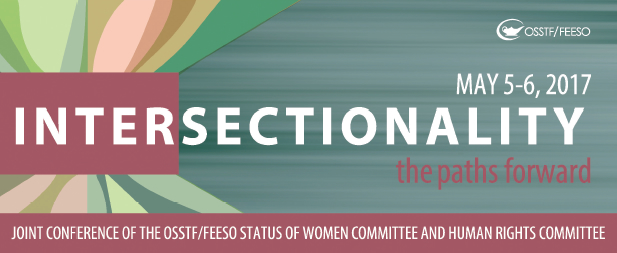
What happens when you spend a Friday night in early May in the company of Susan Ursel, (Human Rights Lawyer), Renu Madhane (Chief Commissioner, Ontario Human Rights Commission), Sandra Hudson (Black Lives Matter), and Hibaq Abdi (Froshability)? You get a jet-fuelled introduction to the most scintillating and stimulating conference on intersectionality you ever hoped for!
Intersectionality is the interconnected nature of social categorizations such as race, class, and gender as they apply to a given individual or group, which can give rise to overlapping and interdependent systems of discrimination or disadvantage. Through an awareness of intersectionality, we can better acknowledge and understand the differences between us, and the related challenges.
The conference began with a passionate and evocative speech from OSSTF/FEESO President Paul Elliott, followed by a panel discussion entitled, “Linking not Ranking,” skillfully moderated by Ursel. Two hours flew by, ending with a rapid-fire discussion based on participants’ texted queries to the panel. This set the scene for the following day’s events. On Saturday morning all participants attended three 45-minute workshops by community groups exploring a vast array of issues. The conference brought participants face-to-face with some of the critical issues of our time: Islamophobia, transphobia, rape culture, online hate speech, Anti-Semitism, ableism, Truth and Reconciliation, gender-based violence, and more. The morning ended with a closing plenary facilitated by Sheetal Rawal (Miss G Project for Equity in Education), who led District groups in discussions focussing their disparate knowledge gleaned from their workshops, into activities and actions that would strengthen equity and human rights work in their respective Districts.
Eunice O’Mahony, Chair of the provincial Human Rights Committee, noted that this conference was three years in the making. The Human Rights and Status of Women Committees spent many months attending joint meetings, exchanging emails, conferring with community leaders, and considering ideas. Many attendees remarked on how well all aspects of the conference were organized. Thank you to the members of the Status of Women and Human Rights committees, and members of provincial staff, for pulling off this remarkable conference.
We heard from panelists and presenters from diverse backgrounds who challenged us to use our power and privilege to lift up those at the margins, to bring them to the centre of the choices we make, both as individuals and as a federation. Lauren Simmons, Chair of the provincial Status of Women committee, reflected, “For me, the resounding message was that, as a white person with access to power, I can change institutions from within, and also within myself, every day.”
/Eunice O’Mahony is the chair of the Provincial Human Rights Committee and Lauren Simmons is the chair of the Provincial Status of Women Committee.